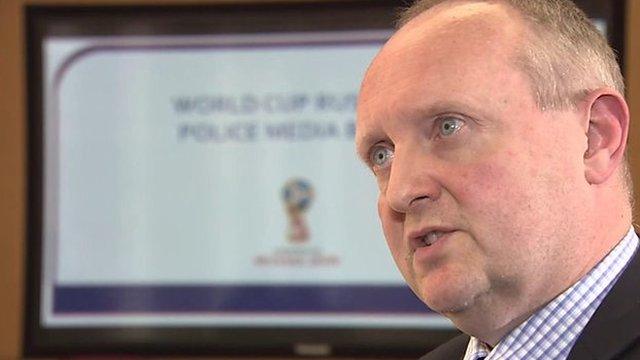'Significant' stadium safety risk for fans, says policing review
- Published
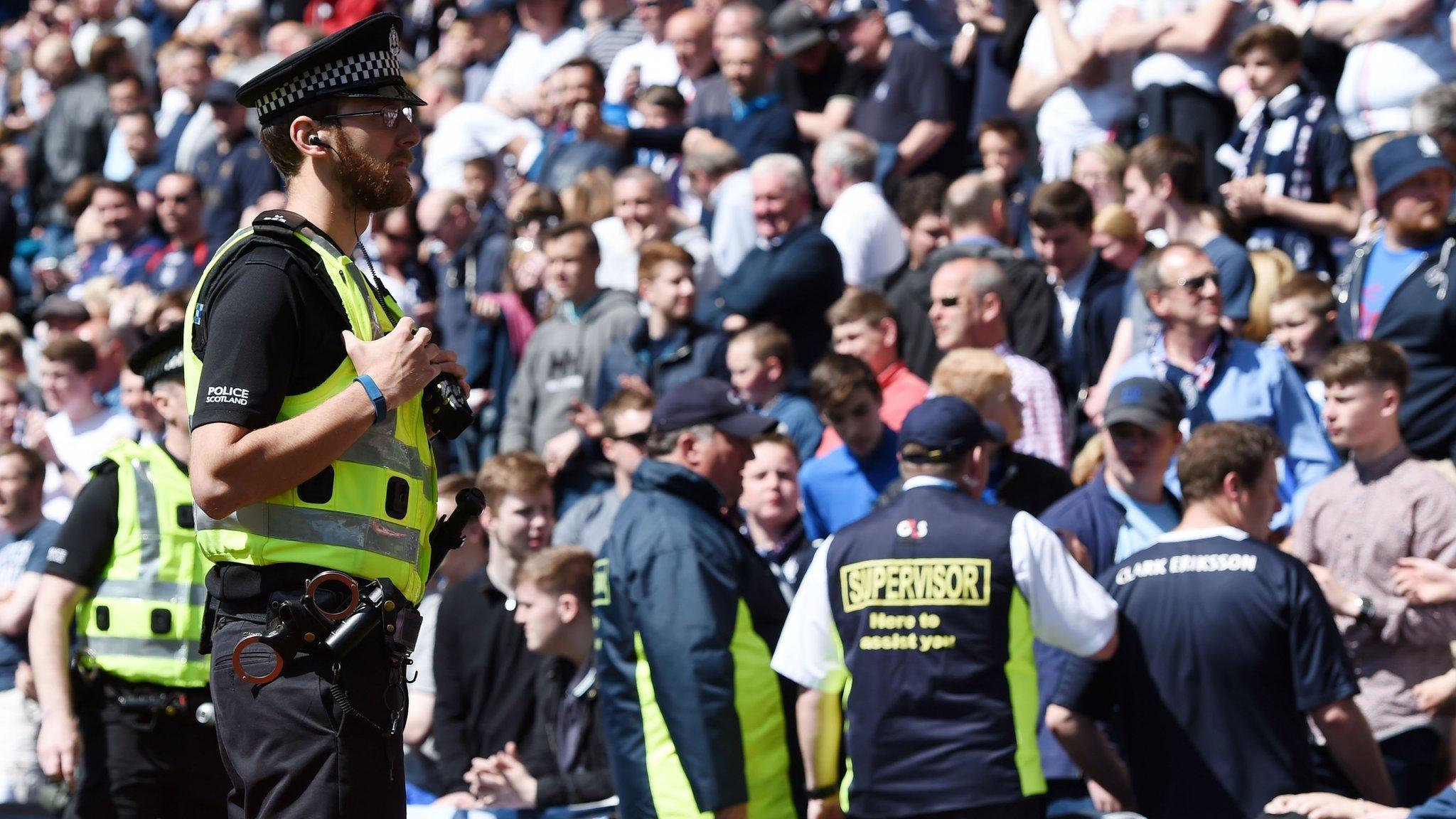
A review has been carried out of policing at football matches
A report into policing in Scottish football has identified serious concerns around stadium safety which are putting fans at risk.
Findings included incidents of clubs gaining safety certificates without stadium inspections and selling more tickets than the ground capacity.
Rangers' away games while in the lower leagues prompted serious concerns.
Unsafe temporary scaffolding was discovered, with safety certificates altered to increase stadium capacity.
The report states, external: "This review highlights a lack of strategic oversight and co-ordination to ensure a corporate approach to safety certification.
"The review takes the view this gap should be seen as a significant risk to the safety of spectators and be addressed with the utmost priority."
The report, which was commissioned by Police Scotland following a crush outside Celtic Park last year, also highlighted a need for better stewarding and better engagement with fans.
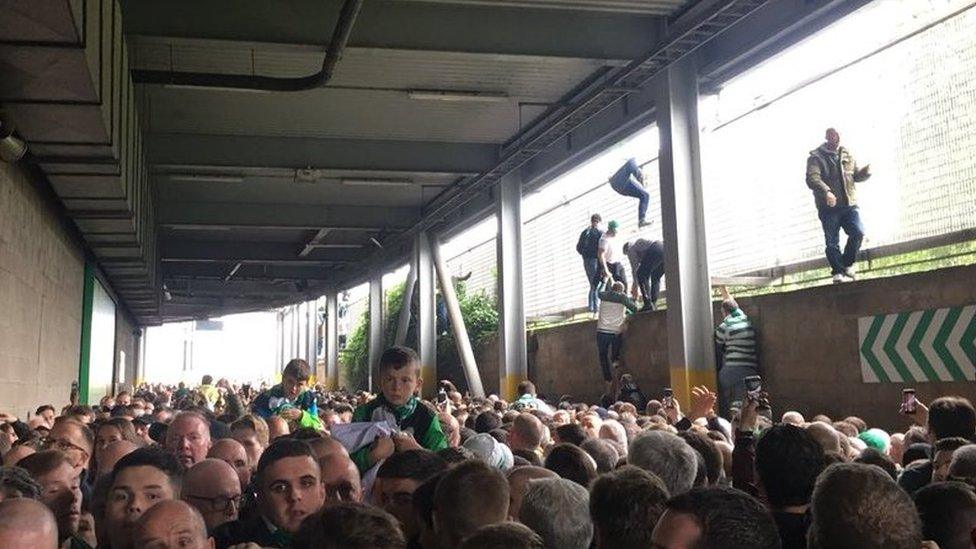
However, Deputy Chief Constable Mark Roberts, who was tasked with compiling the report, says overall the current policing of Scottish football is fit for purpose.
His team looked at operational planning for matches, intelligence gathering and allocation of police resources on match days.
'Urgent attention'
Police Scotland announced they had asked Dep Ch Con Mark Roberts to conduct the review one month after a crush at Celtic Park, but insisted the review was not triggered by a particular incident.
Dep Ch Con Roberts told BBC Scotland news: "Some of the examples that were quoted do give rise for concern and I think it does require a degree of urgent attention.
"I would like the Scottish government to look at the framework to make sure people are properly discharging their responsibilities."
Steward who celebrated goal 'completely unprofessional'
He did take some positives from the findings, highlighting individuals from the SPFL and from the SFA "going above and beyond" to identify risks and prevent them by working with police.
He said: "What you have is lots of professional, competent people, committed to Scottish football, trying to make a system work but they are not being supported by a system."
The Scottish Police Federation (SPF) vice chairman David Hamilton said he "fully supported" the recommendations made in the review - adding the issues surrounding safety at grounds were "utterly devastating".
He continued: "Such a review also opens up the potential to extend licensing arrangements to consider the community impact, travel plans and fan behaviour beyond the footprint of the stadia.
"This would force clubs to take greater responsibility for their fans not just at games but on their way to games too."
Deputy Chief Constable Will Kerr said he felt "reassured" by the report's findings, but pointed to how the issue of stadium safety has been subject to much public and political commentary recently.
He said: "We all have a collective responsibility to make sure we address the one thing that I know fans would be concerned about when they read the report - and that is, is it safe to go to grounds?"

What happened during the crush?
One person was taken to hospital and four more were injured during the crush at Celtic Park on 2 September last year.
The incident happened about 20 minutes before the 12:00 kick-off against Rangers, as Celtic supporters tried to make their way into the stadium.
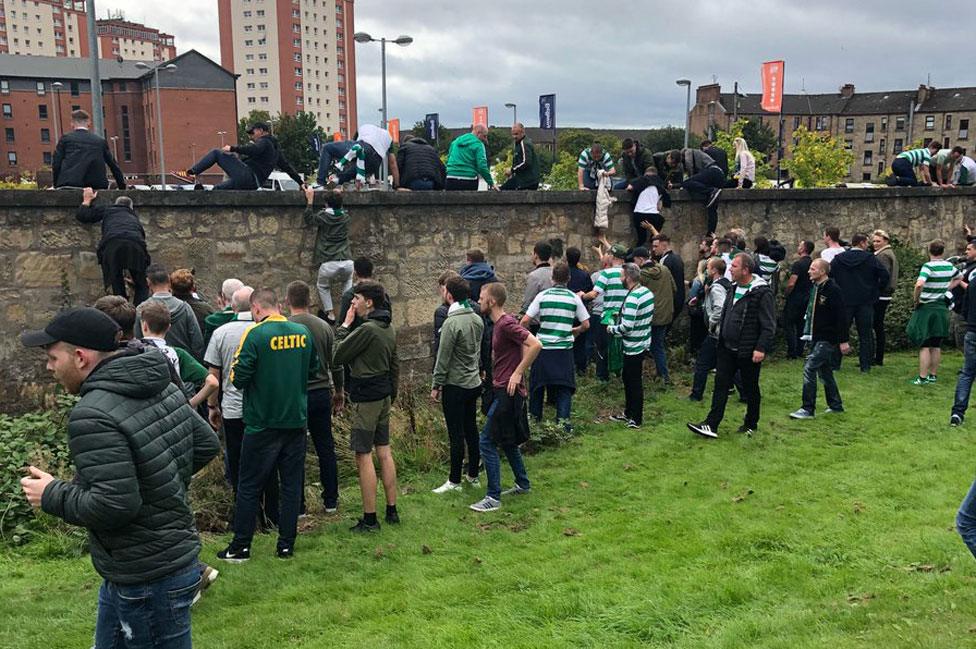
Fans also climbed over a wall at the end of a cemetery outside Parkhead
Celtic later apologised to fans and said the match was the first occasion which featured new segregation and access arrangements for the Old Firm fixture.
Some fans said the new plan resulted in some supporters being forced to climb over a high fence to escape the overcrowding, with one falling from a wall.
Speculation arose regarding a gate having been closed on Janefield Street and contributing to the congestion.
Police insisted, according to their understanding, the gate was open at all times but would have the issue included in the review.
Officers had earlier cordoned off a section of London Road to allow Rangers' 800 fans access, forcing more home supporters than usual to use the Janefield Street entry point.
Fans told BBC Scotland how an atmosphere of "worry and panic" quickly escalated as hundreds were later caught in a second crush in a corridor under the stadium's North Stand.
Police Scotland promised to meet supporters to discuss their concerns following criticism of its operation.
Celtic supporter groups called for a thorough investigation.

'Rights of supporters'
Anticipating the review release, Paul Goodwin, of the Scottish Football Supporters' Association said fans should be told how strict safety checks are at individual grounds.
He told the BBC's Good Morning Scotland programme: "We deserve the right, as customers, to know what grounds have got issues.
"A lot of this comes back to the overall issues within the game, in terms of governance and transparency.
"Fans don't like to be thought of as customers, but sometimes if you draw it back to that conclusion, we deserve to know what the status of the places were are visiting are."
Celtic apologise after fans crush at Old Firm match
The Football Stadium Officers Association (FSOA) said it raised concerns over the "lack of consistency" among local authorities over stadium licensing, specifically how safety certificates have been issued.
A FSOA spokesperson said: "We have raised these concerns with the Scottish government, Cosla and the relevant football authorities."
Convention of Scottish Local Authorities (Cosla) president Alison Evison said the body takes the licensing of stadiums "very seriously".
She continued: "We have a strong record of safety on football events activity. We treat our community safety role with high priority.
"Going forward if there are improvements identified of course local government and Cosla will work positively with partners to find solutions."
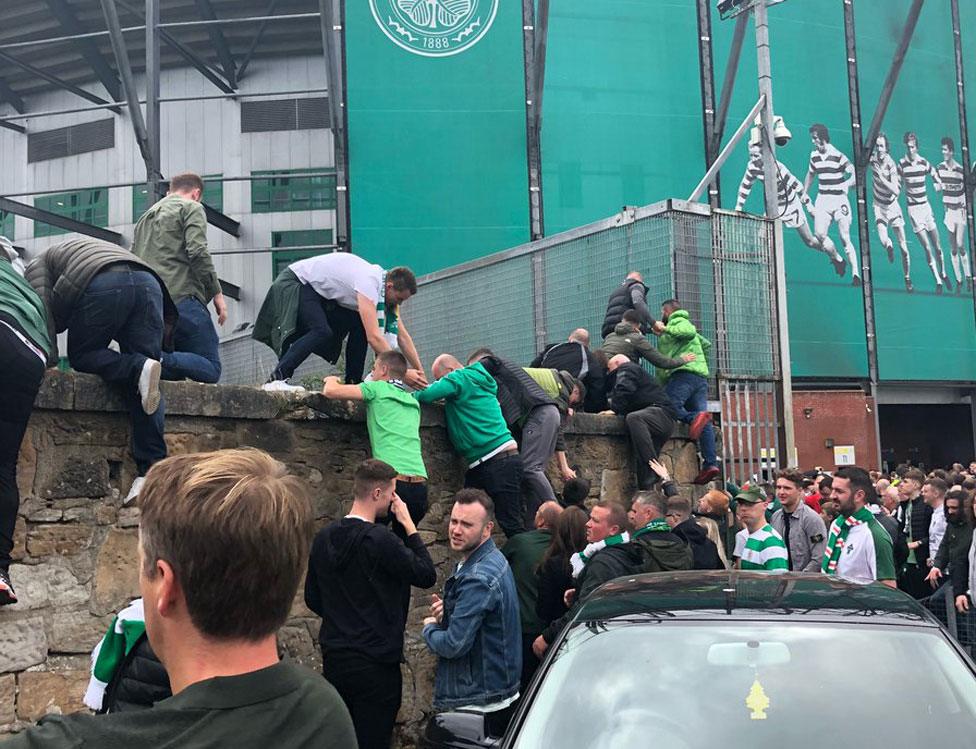
People helped each other to climb over a wall
'Criminalising fans' and 'hooliganism'
Publication of the report comes as the government and football authorities continue to debate issues such as coin throwing and sectarianism.
Prior to the policing review's completion, Jeanette Findlay, chairwoman of the Celtic Trust, said there was a culture inside the police service in Scotland to treat the fans as though they are "potential criminals".
She told the BBC: "The culture is thinking about and planning for games in that way. It's not about thinking, here are a group of citizens who are in a crowd situation and we need to keep them safe."
However earlier this week, Scotland's Justice Secretary Humza Yousaf said serious measures were required to tackle unacceptable conduct at football matches.
His remarks followed a series of incidents, including a glass bottle being thrown at Celtic's Scott Sinclair. at a Scottish Cup match against Hibernian and an object almost hitting Hearts goalkeeper Zdenek Zlamal during a clash with Celtic.
Last month Kilmarnock striker Kris Boyd criticised Celtic fans after being hit by a coin and subjected to sectarian abuse while warming up as a substitute during the sides' meeting at Rugby Park.
Following the review's publication, SPF vice chairman David Hamilton stressed that he agreed Scottish football has a "hooliganism problem as well as a sectarian problem".
He said: "They are both manifestations of the same peculiarity - that some supporter groups believe that criminal behaviour is acceptable at football matches.
"'Fans Against Criminalisation''s refusal to even engage with the review has shown themselves to simply be apologists for this criminality.
"They have refused the opportunity to engage with the review, maintain their entrenched opinions and clearly have no interest in acknowledging yet alone fixing the problems of the Scottish game."
He added: "This is an important point in Scottish Footballs history and if the review is implemented, should lead to a safer, fairer, more secure and pleasant environment for fans and those responsible for looking after them."
- Published3 March 2019
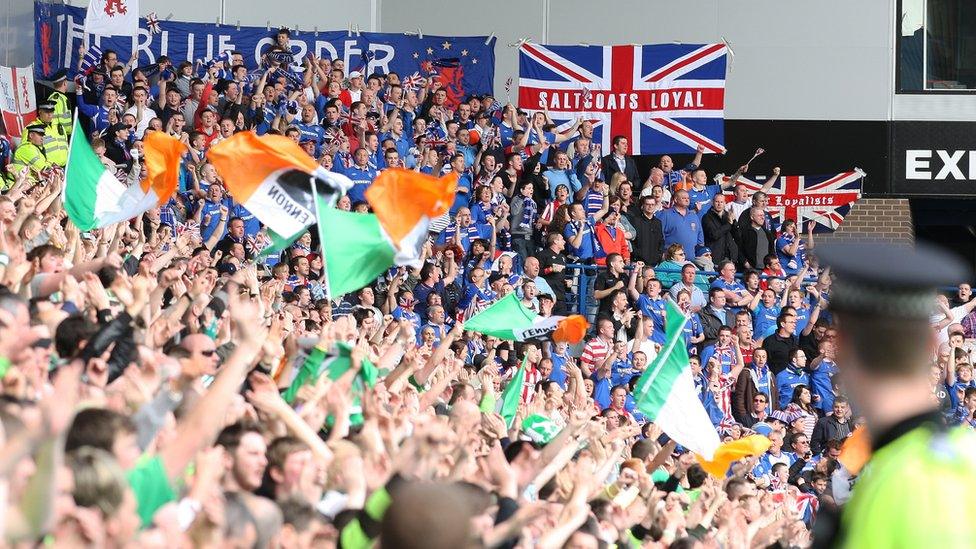
- Published2 October 2018
